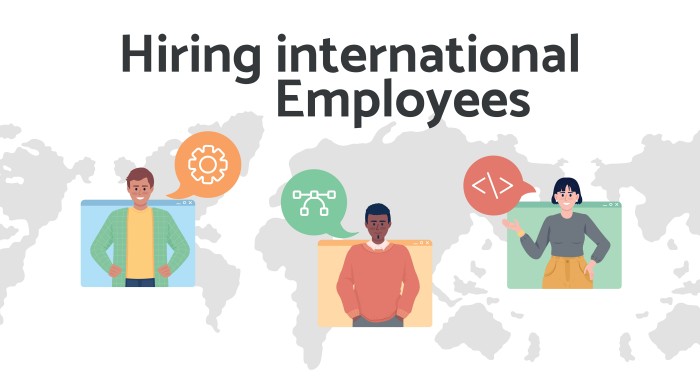
Employing Overseas Workers
Introduction to Employing Overseas Workers in the UK
In today’s dynamic business environment, many UK companies are exploring the option of employing overseas workers. As a seasoned employment lawyer, I understand the desire to broaden the talent pool. The UK offers a wealth of opportunities for skilled professionals from around the globe. However, before doing this it’s crucial to understand the legalities involved.
Why UK Businesses Are Looking to Hire Overseas Talent
The reasons for this surge in interest are manifold:
- Access to a wider talent pool with diverse skill sets
- Meeting specific industry needs which may have local skills shortages
- Fostering a diverse workplace culture
- Tapping into global markets with employees who have first hand knowledge
The Importance of Understanding the Legal Complexities
While the benefits of employing overseas workers are numerous, it’s not without its challenges. UK employment law in this area is complicated and it’s vital to ensure that all processes align with it. Missteps can lead to hefty penalties, not just in terms of financial losses but also in reputational damage.
Firstly, understanding visa and immigration requirements is paramount. These rules dictate who can work in the UK and under what conditions. It’s not just about getting the right paperwork; it’s about ensuring the paperwork aligns with the role you’re offering.
Moreover the rights of overseas workers are equivalent to those of UK residents. This means that employers need to be conversant of the requirements regarding minimum wage, working hours and other statutory rights.
One of the main challenges lies in tax and National Insurance considerations. Employing someone from another country brings its own set of tax implications. It’s crucial to get this right from the outset to avoid future complications.
Lastly, integrating and supporting these employees is an aspect that many businesses overlook. Consider cultural sensitivity training, adjustments to HR practices to ensure these workers feel valued and supported.
In conclusion, employing overseas workers in the UK presents an exciting opportunity for businesses. However, it’s not to be taken lightly. Proper understanding, preparation and ongoing support are key to a successful overseas hiring strategy. As always, consulting with an employment law specialist can ensure your business remains compliant and reaps the full benefits of this global talent pool.
Visa and Immigration Essentials
The UK’s visa and immigration system can be daunting, especially when employing overseas workers. The list of requirements and paperwork is enough to deter many, but with proper guidance the process becomes more manageable.
The Different Types of Visas Available for Overseas Workers
The UK offers a range of visas, each designed for specific purposes and time frames:
- Tier 2 (General) Visa: For individuals with a job offer in the UK from a licensed Tier 2 Sponsor.
- Tier 5 Temporary Worker Visa: For short-term employment opportunities.
- Global Talent Visa: For leaders or potential leaders in academia, research, arts, and more.
- Start-up and Innovator Visas: For those looking to establish a business in the UK.
The Points-Based System (PBS) and Sponsorship Licences
A Points-Based System (PBS) is central to the UK’s immigration framework. It’s essential for employers to familiarize themselves with this system. Under PBS, overseas workers must accumulate a certain number of points based on criteria such as qualifications, future earnings and English language skills. Remember, as an employer, you play a pivotal role in this process.
Sponsorship Licences are another critical element. If you aim to hire non-European Economic Area workers, you’ll likely need a sponsorship licence. Once you have this, you can then issue Certificates of Sponsorship to prospective employees. It’s a responsibility, though as the government expects you to adhere strictly to your duties as a sponsor.
Tips for Navigating the Home Office’s Stringent Requirements
Dealing with the Home Office’s requirements might feel overwhelming, but these tips can help streamline the process:
1. Always stay updated on immigration rules, as they can change.
2. Ensure all documentation is complete and accurate. Incomplete applications can lead to delays or refusals.
3. Consider seeking legal advice. Experienced employment lawyers can provide valuable insights, saving time and potential legal complications.
In summary, while the visa and immigration system for employing overseas workers in the UK is complicated, it’s navigable with the right knowledge. Staying informed and seeking expert guidance can ensure you successfully bring valuable international talent to your team.
Key Employment Rights for Overseas Workers
When considering employing overseas workers in the UK, it’s paramount to recognise that their rights are by no means inferior to those of UK residents. In my years of experience as an employment lawyer, I’ve witnessed businesses inadvertently infringe upon these rights due to lack of understanding or oversight. So, let’s look more deeply into these crucial employment rights.
Equal Rights and Protections Under UK Employment Law
The bedrock principle here is equality. Overseas workers, regardless of their visa type or duration of stay, are entitled to the same employment rights as local hires. This encompasses protection against discrimination, unfair dismissal and entitlement to statutory benefits like maternity leave. The onus is on you, the employer, to ensure these rights are honoured.
Addressing Common Misconceptions and Pitfalls
Misconceptions abound in this area and they can lead to unintentional legal breaches. One common fallacy is that overseas workers can be paid less than the national minimum wage. This is unequivocally untrue. Whether from Birmingham or Bangkok, every employee has a right to at least the national minimum wage. Another misconception is that overseas workers can be made to work longer hours than stipulated by UK laws. Again, this is incorrect. Work hours, rest breaks, and paid leave entitlements remain consistent, irrespective of the employee’s origin.
Ensuring Compliance with Minimum Wage, Working Hours, and Other Statutory Rights
It’s essential to have systems in place to ensure continuous compliance. Regularly review employment contracts, keep abreast of changes in statutory entitlements and maintain open communication with your employees. Encourage them to raise concerns and be proactive in addressing them. For instance, if an overseas worker isn’t familiar with the concept of bank holidays, explain it to them and ensure they benefit from it.
Understanding the Implications of Breaches
The consequences of not adhering to these rights can be severe. Apart from legal ramifications, including hefty fines, there’s the potential reputational damage to consider. In our digital age, negative experiences can quickly circulate, damaging trust and potentially affecting your business’s bottom line. More importantly, ethical considerations come into play. Treating every employee with fairness and respect is not just a legal obligation; it’s the right thing to do.
In closing, employing overseas workers brings with it a responsibility to uphold their rights diligently. With the right knowledge, adherence to UK employment laws, and a genuine commitment to ensuring a fair and inclusive workplace, you can build a strong, diverse and compliant workforce.
Tax and National Insurance Considerations
When employing overseas workers, understanding the nuances of tax and National Insurance in the UK becomes crucial. Drawing from years of experience as an employment lawyer, I’m here to guide you through these vital considerations.
The Implications of Employing Someone from Abroad
First and foremost, irrespective of their origin, every employee needs to be correctly integrated within the UK tax system. This means they should have a National Insurance number, and you’ll need to set them up on your Pay As You Earn (PAYE) system. Through this system, deductions for tax and National Insurance will be made from their wages.
However, while these steps seem straightforward, the international dimension can add layers of complexity. An overseas employee might have ongoing tax obligations in their home country. This scenario often leads businesses to a key term: double taxation agreements. These agreements ensure that the worker doesn’t face taxation on the same income in two countries. Hence, it’s imperative to familiarise oneself with such agreements if they apply to your overseas employee’s native country.
Setting up PAYE for Overseas Employees
PAYE, or Pay As You Earn, is the system employed by HMRC to collect Income Tax and National Insurance from employment. When setting up PAYE for overseas employees, it’s essential to remember several points:
– You must register as an employer with HMRC, especially if you’re doing so for the first time, and this should be done before your employee’s first payday.
– Utilising payroll software is advisable. This software will help you record employee details, compute their pay, manage deductions, and regularly report to HMRC.
– Additionally, always ensure that reporting to HMRC is done on or before each payday to maintain compliance.
The world of tax and National Insurance for overseas workers doesn’t need to be overwhelming. By understanding the basics and seeking expert advice when needed, you can successfully manage the financial aspects of your diverse workforce.
Integration and Support for Overseas Employees
Welcoming overseas employees into a UK-based business correctly is crucial. Beyond the contracts and legalities lies the genuine human aspect of integration and support. As an employment lawyer, I’ve witnessed how businesses that prioritize the well-being and integration of their international talent not only foster a more harmonious workplace but also boost productivity and retention rates. Let’s look at the key elements of integrating and supporting overseas employees effectively.
Understanding the Unique Challenges They Face
Overseas employees often struggle with challenges that their local counterparts might not encounter. From adapting to a new culture and work environment to navigating the logistics of living in a new country, these challenges can be daunting. Recognising and empathising with these challenges is the first step in creating a supportive work environment.
Facilitating Seamless Onboarding
Onboarding is the initial phase where overseas employees form their first impressions of the company. Ensuring a smooth onboarding process that includes a mix of professional training and cultural immersion can set a positive tone for their entire tenure. Offering insights into UK work culture, business etiquette and even local customs can make a significant difference.
Cultural Sensitivity Training for Existing Staff
It’s not just the overseas employee who needs support; existing staff can benefit from cultural sensitivity training. This training provides insights into the cultural backgrounds of the new hires, facilitating understanding and reducing unintentional misunderstandings. Such initiatives showcase a commitment to a diverse and inclusive workplace.
Setting up Mentorship or Buddy Systems
A mentorship or buddy system is an excellent way for overseas employees to have a go-to person within the organisation. This designated individual can assist with both work-related queries and general adjustments, ensuring that the new employee doesn’t feel isolated or overwhelmed. The relationships formed through these systems often go a long way in ensuring employee satisfaction and integration.
Access to Resources and Support Services
Whether it’s assistance with finding accommodation, understanding local public services, or even learning the nuances of UK banking, offering access to resources can be invaluable for someone new to the country. By setting up a source of helpful guides or offering workshops on these subjects, employers can demonstrate their commitment to the holistic well-being of their overseas staff.
In conclusion, employing overseas workers is as much about human connection as it is about contracts and compliance. By taking proactive steps to integrate and support these employees, businesses can ensure a smoother transition for them while enriching the company culture. A diverse and inclusive workplace isn’t just a buzzword; it’s the bedrock of a modern, forward-thinking organisation.
Call John Bloor at EBS Law on 01625 87 4400 if you are an employer and need free Employment Law Advice.


